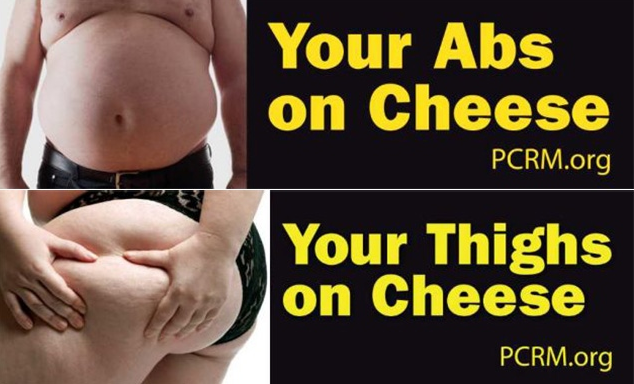‘Cheese makes you chubby’ New York billboards scream

The Washington-based non-profit organisation has sponsored the billboards (pictured), and PCRM president Neal Barnard, MD said he had written to members of the City of Albany school board.
His message to the city? “Cut down on dairy products served in schools to help students reduce the risk of childhood obesity.”
Warning that cheese, in particular, posed a health and contributed to the area’s high obesity rates, Barnard said: “Typical cheeses are 70% fat. And the type of fat they hold is mainly saturated fat, the kind that increases your risk of heart disease and diabetes.
“Cheese is also loaded with cholesterol and sodium. Americans eat more than 33 pounds (approximately 15kg) of cheese per person per year, three times more than they did in 1970, and our country is more obese than ever.”
According to figures quoted by the PCRM, 59% of New York State residents are either overweight or obese, with the figures even higher in Albany County: 63% of adults overweight or obese.
The New York State Department of Health has said that the state faces a childhood obesity crisis, with one out of every four people under the age of 18 obese, while the obesity rate for children between 6-11 years has quadrupled over 30 years.
The PCRM said that Albany school lunches included an abundance of cheesy foods, and that the city’s high school menu included “dairy and fat-loaded offerings” such as chicken parmesan and thee-cheese lasagna, while cheese pizzas were sold every day.
Giving dairy its due?
Asked what he thought of the billboards, Tam Fry, from the UK-based National Obesity Forum (NOF) told DairyReporter.com that similar tactics were being adopted in the US states of Florida and Georgia. “It’s a really divided thing. It’s certain that cheese is full of fat, and therefore could be considered as not being very healthy.
“However, it remains a dairy product, one of the essential food groups. Clearly then, the advice is that cheese is beneficial to health. However, too much cheese can be detrimental, because it can contribute to furring of the arteries, and therefore lead to cardiovascular problems.
“Using a traffic light system, cheese qualifies for a red light saying ‘don’t eat or eat only rarely’. But cheese is hugely beneficial to children – because it has a lot of other attributes, look at calcium for teeth – but there again it should also be eaten in moderation.
“But where these posters are really advantageous is drawing attention to products such as cheeseburgers,” Fry added. “You never know what cheese is being used in these. So it’s a shock, in your face.
"However, it’s the kind of tactic that we may need and may see more of in the future, because we have obesity levels at such a rate (not just in the UK but worldwide), that something drastic has got to be done to ameliorate it."
Dietary Guidelines for Americans
Cheese was pinpointed by the PCRM as the number-one source of saturated fat in the US diet, and the Dietary Guidelines for Americans 2010 back this up, although they recommend consumers increase intake of fat-free milk or low-fat milk and milk products, such as milk, yogurt, cheese or fortified soy beverages.
Chapter 3 of the guidelines lists major saturated fatty acids sources in the US diet: with full-fat cheese responsible for 8.5% of total intake, followed by pizza (5.9%), grain-based deserts (5.8%), dairy-based desserts (5.6%), chicken and chicken-mixed dishes (5.5%) and sausage, franks, bacon, ribs (4.9%).
The guidelines note that although the body uses saturated fatty acids for physiological and structural functions, “it makes more than enough to meet those needs”.
Thus, people have no dietary requirement for saturated fat, the guidelines state, while a “strong body of evidence indicated that higher intake of most dietary saturated acids is associated with higher levels of blood total cholesterol and low-density lipoprotein (LDL)”, risk factors for cardiovascular disease.
Thus, the guidelines suggest consuming less that 10% of calories from saturated fatty acids and replacing these with monounsaturated or polyunsaturated alternatives.
However, the 2010 US guidelines do recommend retaining dairy, meat and poultry in the diet as valuable sources of natural trans fatty acids, although they also note that cheese is responsible for 8% of solid fats in the national diet.




















